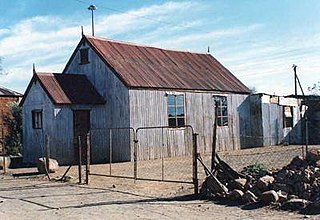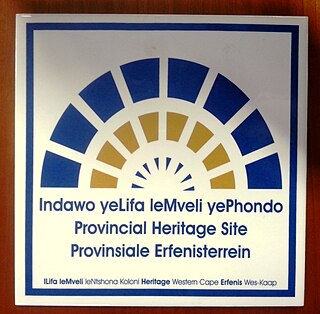
Solomon Tshekisho Plaatje was a South African intellectual, journalist, linguist, politician, translator and writer. Plaatje was a founder member and first General Secretary of the South African Native National Congress (SANNC), which became the African National Congress (ANC). The Sol Plaatje Local Municipality, which includes the city of Kimberley, is named after him, as is the Sol Plaatje University in that city, which opened its doors in 2014.

Kimberley is the capital and largest city of the Northern Cape Province of South Africa. It is located approximately 110 km east of the confluence of the Vaal and Orange Rivers. The city has considerable historical significance due to its diamond mining past and the siege during the Second Boer War. British businessmen Cecil Rhodes and Barney Barnato made their fortunes in Kimberley, and Rhodes established the De Beers diamond company in the early days of the mining town.

Pilgrim’s Rest is a small museum town in the Mpumalanga province of South Africa which is protected as a provincial heritage site. It was the second of the Transvaal gold fields, attracting a rush of prospectors in 1873, soon after the MacMac diggings started some 5 kilometres (3.1 mi) away. Alluvial panning eventually gave way to deeper ore mining. In the 1970s the town, not greatly changed, became a tourist destination.

Galeshewe is a township in Kimberley, South Africa. Within the Sol Plaatje Local Municipality in the Northern Cape Province, it is named after Kgosi Galeshewe.

The McGregor Museum in Kimberley, South Africa, originally known as the Alexander McGregor Memorial Museum, is a multidisciplinary museum which serves Kimberley and the Northern Cape, established in 1907.

The Pretoria Forts consists of four forts built by the government of the South African Republic (ZAR) just before the outbreak of the Second Anglo-Boer War around their capital of Pretoria.

Provincial heritage sites in South Africa are places that are of historic or cultural importance within the context of the province concerned and which are for this reason declared in terms of Section 28 of the National Heritage Resources Act (NHRA) or legislation of the applicable province. The designation was a new one that came into effect with the introduction of the Act on 1 April 2000 when all former national monuments declared by the former National Monuments Council and its predecessors became provincial heritage sites as provided for in Section 58 of the Act.
The Malay Camp in Kimberley, South Africa, was a cosmopolitan suburb which was subject to forced removals prior to the Group Areas Act.
The Barkly West Museum was established in 2000 in the old Toll House beside the Barkly Bridge which crosses the Vaal River at Barkly West in the Northern Cape, South Africa.

The Department of Basic Education (DBE) is one of the departments of the South African government. It oversees primary and secondary education in South Africa. It was created in 2009 after the election of President Jacob Zuma, when the former Department of Education was divided.

The Department of Higher Education and Training is one of the departments of the South African government. It oversees universities and other post-secondary education in South Africa. It was created in 2009 after the election of President Jacob Zuma, when the former Department of Education was divided.

Sol Plaatje Dam is an earth-fill type dam located at the confluence of the As and Liebenbergsvlei Rivers near Bethlehem, Free State, South Africa. It was established in 1968 and serves mainly for municipal and domestic water supply. The hazard potential of the dam has been ranked high. The reservoir receives water from the Lesotho Highlands Water Project via the As River.
Elizabeth Anne Voigt was director of the McGregor Museum in Kimberley, South Africa, and, as an archaeozoologist, served a term as president of the South African Archaeological Society. In retirement, Voigt was appointed a research associate of the McGregor Museum. She was born in Cape Town on 26 April 1944 and died on 7 April 2010 in Kimberley.
The Old School of Mines building in Hull Street, Kimberley, is where the South African School of Mines was established in 1896, later evolving into the Transvaal University College, and eventually into both the University of the Witwatersrand and the University of Pretoria. In 1904 the school was moved to Johannesburg, becoming the Transvaal Technical Institute which, in turn, was renamed the Transvaal University College in 1906. The separation of Johannesburg and Pretoria campuses in 1910 paved the way for establishment of the Universities of the Witwatersrand (1922) and of Pretoria (1930).

The National Monuments Council (NMC) was the national heritage conservation authority of South Africa, and therefore also of Namibia, during the major part of the apartheid era. It was the successor body to the Historical Monuments Commission and became known principally for its declaration of several thousand national monuments. It came into being through the promulgation of the National Monuments Act of 1969 and ceased to exist on 31 March 2000 when it was replaced by SAHRA and the provincial heritage resources authorities established in terms of the National Heritage Resources Act of 1999.

The Sol Plaatje University, which had provisionally been referred to as the University of the Northern Cape, opened in Kimberley, South Africa, in 2014, accommodating a modest initial intake of 135 students. The student complement is expected to increase gradually towards a target of 7 500 students by 2024. Launched in a ceremony in Kimberley on 19 September 2013, it had been formally established as a public university in terms of Section 20 of the Higher Education Act of 1997, by way of Government Notice 630, dated 22 August 2013. Minister of Higher Education and Training, Blade Nzimande, observed at the launch that this “is the first new university to be launched since 1994 and as such is a powerful symbol of the country’s democracy, inclusiveness, and growth. It represents a new order of African intellect, with a firm focus on innovation and excellence." Previously announcing the name for the university, on 25 July 2013, President Jacob Zuma mentioned the development of academic niche areas that did not exist elsewhere, or were under-represented, in South Africa. "Given the rich heritage of Kimberley and the Northern Cape in general," Zuma said, "it is envisaged that Sol Plaatje will specialise in heritage studies, including interconnected academic fields such as museum management, archaeology, indigenous languages, and restoration architecture." Prof Andrew Crouch took over the helm on 1 April 2020 after the term of founding Vice-Chancellor, Prof Yunus Ballim came to a close.
The Northern Cape Heritage Resources Authority, previously called Ngwao Boswa jwa Kapa Bokone, and commonly known as 'Boswa', is a provincial heritage resources authority established in 2003 by the MEC for Sport, Arts and Culture in the Northern Cape Province of South Africa, and reconstituted in terms of the Northern Cape Heritage Resources Authority Act, 2013. It is an institution set up under the terms of the National Heritage Resources Act. It is mandated to care for that part of South Africa's national estate that is of provincial and local significance in the Northern Cape.

Wynand Johannes Boshoff is a South African academic and politician from the Northern Cape serving as a Member of the National Assembly of South Africa for the Freedom Front Plus (FF+) since 2019. He has been serving as the Provincial Leader of the FF+ since 2015. He previously served as a municipal councillor of the Sol Plaatje Local Municipality from 2016 to 2019. Boshoff is the grandson of the assassinated apartheid-era Prime Minister of South Africa, Hendrik Verwoerd, who served from 1958 until 1966, and the son of Afrikaner enclave Orania founder, Carel Boshoff.
Solomon Patrick Mabilo is a South African politician from the Northern Cape who has been serving as the Executive Mayor of the Sol Plaatje Local Municipality centred around Kimberley. A member of the African National Congress (ANC), he was previously a Member of the National Assembly of South Africa (2014–2017) and the Northern Cape Provincial Legislature. Within the Northern Cape provincial government, he served as the MEC for Transport, Safety and Liaison (2009–2013) and the MEC for Environment and Nature Conservation (2013–2014).













